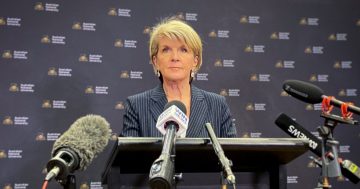
ANU Vice-Chancellor Professor Genevieve Bell has resigned. Photo: Andrew Mears/ANU.
UPDATE 11:35 am – The ANU has now independently confirmed Professor Genevieve Bell has stepped down as Vice-Chancellor and President of the university.
In a statement, Professor Bell said it had not been an easy decision.
“As many of you know, the ANU has been a special place for me, ever since I was a child. And being its 13th Vice Chancellor has been an extraordinary privilege and also a heavy responsibility,” she said.
“Like the rest of our community, I believe firmly in our delivering on our national mission – to create and transmit knowledge through research and teaching of the highest quality. And know that doing this requires a solid financial, cultural and operational foundation.
“Achieving such a foundation has been difficult and this has been a very hard time for our community. I am grateful for all the ways that people have shown up and for all the work that has been done and the progress we have made.
“Like the rest of our community, I know there is still more work to do so. I very much want to see the ANU thrive into the future and for it to continue to be a remarkable place and I don’t want to stand in the way of that.
“So I am stepping down from my role as Vice Chancellor. My plan is to take time off, including a period of study leave, and then return to the School of Cybernetics as a Distinguished Professor where I hope to continue to contribute to our community.”
11:15 am – Australian National University Vice-Chancellor Professor Genevieve Bell has resigned after months of calls for her to step down.
Rumours have been flying for almost two weeks about her position after Chancellor Julie Bishop arrived on campus at the start of the month. Professor Bell’s weekly VC update and comment in the all-staff On Campus newsletter were both missing this week.
The ANU was expected to send out a statement at 11 am today (11 September). Instead, staff found out from the National Tertiary Education Union.
“This is a short email to let you know that the Vice-Chancellor of the Australian National University, Professor Genevieve Bell, has resigned.”
NTEU ACT Division Secretary Dr Lachlan Clohesy and ANU Branch President Millan Pintos-Lopez met with Chancellor Julie Bishop this morning.
Region understands Ms Bishop confirmed Professor Bell’s resignation to them.
They also discussed leadership and governance concerns, and reiterated their call for no forced redundancies.
Dr Clohesy said while Professor Bell’s resignation was welcomed, “nobody takes delight in the situation” that the ANU was in.
“In the last two years, ANU leadership has taken an approach of moving fast and breaking things. Unfortunately, too many of those things were people,” he said.
“Changing the Vice-Chancellor will not fix the ANU’s issues unless governance concerns are also addressed. The Chancellor still faces serious allegations, and under her watch, ANU is now subject to investigation by TEQSA and the Fair Work Ombudsman. We believe Comcare should also be looking closely at the ANU.”
NTEU national president Dr Alison Barnes said all other universities should take heed of what had occurred at the ANU.
“Unfortunately, what’s playing out at ANU is far from an isolated case. A completely broken governance system has allowed unaccountable executives to cause enormous damage to staff, students and communities,” she said.
“The NTEU will continue to fight hard nationally for major governance reform to stop the type of profound leadership failures we’ve seen at ANU.”

ACT Senator David Pocock, with NTEU ACT division secretary Dr Lachlan Clohesy, has been calling for Prof Bell’s resignation. Photo: James Coleman.
One political voice that has been loudly calling for Professor Bell’s resignation is independent ACT Senator David Pocock.
He said while he’d initially welcomed her appointment as the first woman to lead the ANU, her leadership had become untenable in recent months.
“While there is broad understanding of the need to put the ANU on a more sustainable financial footing, there have been serious failures of leadership and governance in the implementation of Renew ANU,” he said.
“Renew ANU has caused enormous harm to staff, students and the reputation of our national university.”
He supported Professor Bell’s removal, but said further leadership changes were needed.
“The Chancellor faces serious bullying and workplace harassment allegations and has presided over a period that saw a significant decline in the university’s financial position and governance arrangements,” Mr Pocock said.
“Most importantly, there must be a stop to any further forced redundancies including for the change management plans that have yet to be finalised until there is more transparency over the ANU’s financial position and genuine consultation over a way forward.
“The ANU must embark on a period of rebuilding, and I will be there to support staff and students every step of the way.”
ACT Senator Katy Gallagher said the Renew ANU program had been “poorly executed” and damaged the university’s reputation.
“Responsibility for that cannot be placed on one individual,” she said.
“As a Senator for the ACT, along with my fellow ACT MPs, I have received sustained representations from concerned Canberrans who work or study at the university, or who are connected to the ANU through our local community.
“I have previously called on the ANU Council to work openly and proactively to establish an independent fact base and rebuild trust with the community.
“This remains my view, and I urge the Council and university leadership to reset and reach agreement with the broader ANU community on the path forward.”
ANU student bodies have also been calling for both Professor Bell and Ms Bishop to go.
Protest group OurANU said further accountability was also needed over the “damage” caused by Renew ANU.
“It has undermined disciplines, harmed individuals, and diminished the university’s reputation. It must stop. All involuntary redundancies should be cancelled. No amalgamations or disbanding of schools and centres of national significance should proceed,” a statement read.
“Renew ANU is not the work of one individual. It is the product of years of governance failure. There must be accountability for those decisions.
“We ask all remaining executives to ask themselves if they are the people right for the job of finding new ways to work with the ANU
community.”
The investigation into the ANU’s governance will continue, and the regulator’s report is expected to be made public.
Original Article published by Claire Fenwicke on Region Canberra.







